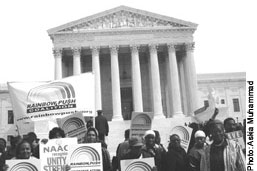- Court Grapples with Univ. of Michigan Affirmative Action Plans (BlackPressUSA)
- Virginia Tech Restores Affirmative Action Policy (Southern Digest)

WASHINGTON (FinalCall.com)–As many as 10,000 Black students and supporters of affirmative action rallied in bitter cold conditions in front of the Supreme Court April 1 as the Justices heard oral arguments on two cases involving White plaintiffs who were denied admission to the University of Michigan and its law school.
Led and organized by a large contingent from Howard University and the NAACP, many of the young demonstrators–along with parents, grandparents, and children–said their presence was sending a strong message not just to the nine Justices but to the entire nation.
The noisy demonstration added a sense of urgency to the deliberations over the case some civil rights activists consider the most important the high court has considered in a generation.
“Jim Crow, hell no!” and “Two, four, six, eight, we don’t want to segregate!” some demonstrators chanted while the attorneys inside presented oral arguments and answered questions from the Justices.
“The people were outraged that the president of the United States would come out to oppose the position of integration at the time he’s taking the country to war,” said Hilary Shelton, director of the Washington Bureau of the NAACP, describing the crowd.
“As you see, the streets in front of the Supreme Court were packed to the rafters, to say, as African Americans, Hispanics, Native Americans, White Americans, Jews and gentiles, ‘We want a diverse nation,’” he continued.
The outcome of this case could literally decide the future of this country in the 21st century, according to one civil rights veteran. At issue is whether or not race can be a factor that favors Blacks in this country, just as it has been a basis of prejudice and bias for more than 450 years.
“No country with the diversity of the United States can long survive unless every aspect of our society is included in its opportunities,” Wade Henderson, executive director of the Leadership Conference on Civil Rights told The Final Call.
“That’s what this case is about, and if it’s decided the wrong way, we may well see the return of Plessy vs. Ferguson. If not in fact, then in practice by way of the elimination of affirmative action,” he continued, referring to the landmark 1896 “separate but equal” decision by the court.
For the last 25 years the Supreme Court has failed to properly consider the use of race in remedial circumstances that would help to address situations in this country that Blacks confront daily. Even institutions with an historic record of discriminating, have never been required to acknowledge the nature of that discrimination as a barrier of opportunity, said to Mr. Henderson.
Ironically, the most significant point in the oral arguments may have turned on a brief submitted by more than a dozen retired military officers who talked about the importance of diversity and affirmative action for the American military system, according to legal experts who attended the session in person.
“So, if the military recognizes that they’ve discriminated on the basis of race, if they can recognize it, clearly, our education institutions should recognize it. Our businesses should recognize it. And quite clearly the Supreme Court should recognize it,” Harvard Law School professor Charles Ogletree said in an interview. “I’m an optimist on this one. I think we’ve got enough votes.”
The point that was made in the “friend of the court” brief filed by the retired military officers “made the point that unless there’s an inclusive society, a society that takes into account the circumstances of all its citizens, it represents a clear and present danger to the future and safety of our own country,” said Mr. Henderson. “I think that argument will have tremendous impact on the court.”
“We know that 20 percent of the Armed Forces are African American,” said Mr. Shelton, “and there’s a great diversity in the rest of the Armed Forces. But (Mr. Bush) wants to stop them when they come back from being able to attend our institutions of higher education. It’s shameful and despicable. As a result, Americans came out and said, we’re not standing for this.”












